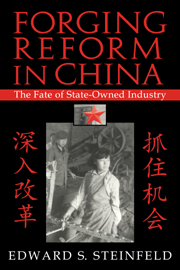Book contents
- Frontmatter
- Contents
- List of Tables and Figures
- Preface
- 1 Introduction: China's Ailing State Enterprises
- Part I Conceptual Approaches to Postsocialist Enterprise Reform
- Part II Enterprise Case Studies: The Commanding Heights in Transition
- 4 The Living Museum of Iron and Steel Technology
- 5 King of the Red Chips: Ma'anshan Steel and the Debacle of the “Public” SOE in China
- 6 Shougang: The Rise and Fall of an Industrial Giant
- Part III Reassessing Chinese Patterns of Economic Development
- Notes
- Bibliography
- Index
6 - Shougang: The Rise and Fall of an Industrial Giant
Published online by Cambridge University Press: 12 January 2010
- Frontmatter
- Contents
- List of Tables and Figures
- Preface
- 1 Introduction: China's Ailing State Enterprises
- Part I Conceptual Approaches to Postsocialist Enterprise Reform
- Part II Enterprise Case Studies: The Commanding Heights in Transition
- 4 The Living Museum of Iron and Steel Technology
- 5 King of the Red Chips: Ma'anshan Steel and the Debacle of the “Public” SOE in China
- 6 Shougang: The Rise and Fall of an Industrial Giant
- Part III Reassessing Chinese Patterns of Economic Development
- Notes
- Bibliography
- Index
Summary
INTRODUCTION
THE preceding case studies have described how partial reforms in China's economic system inhibit market-oriented behavior in large industrial producers. Managers have certainly been encouraged to maximize profits, but in an environment of soft budgets, profit maximization has often translated into asset destruction. In such a setting, property rights, ownership, and corporate governance essentially fail to function. Initial indications from firms like Magang and Tsingtao Brewery suggest that, under such circumstances, internal restructuring – the issuance of stock, expansion of managerial autonomy, and exposure to foreign capital flows – simply expands the opportunities for valuesubtracting business strategies. Policy makers have aggressively attempted to reform the firm from within, but they have been far less successful and enthusiastic in reforming the firm from without. In short, they have never fully tackled the regulatory environment. The unfortunate lesson of firms like Angang and Magang is that when external regulatory institutions remain at best partially reformed, even the most progressive internal restructuring efforts lead to chaos. It is one thing in such an environment to encourage commercial behavior in peasant producers or small industrial firms. It is another thing entirely to encourage such behavior in complex production organizations that by definition feature complicated relationships between ownership and control.
Certainly one broad lesson from the Chinese experience is that institutional forms from one type of socioeconomic system cannot be casually picked up piecemeal and transplanted onto another.
- Type
- Chapter
- Information
- Forging Reform in ChinaThe Fate of State-Owned Industry, pp. 165 - 224Publisher: Cambridge University PressPrint publication year: 1998

